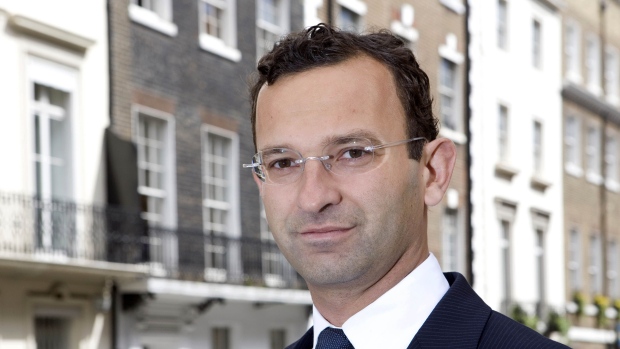Feb 9, 2024
Caner’s €300,000 Monthly Fee Irks Some Lenders to Berlin Project
, Bloomberg News

(Bloomberg) -- A proposal that would allow real estate mogul Cevdet Caner to make a little money on the side from the meltdown of Aggregate Holdings SA, the property investment firm that he runs, is being challenged by some creditors.
As lenders to one of Aggregate’s most ambitious developments face steep losses, a firm owned by the Austrian tycoon stands to make €300,000 ($323,340) a month in fees as a consultant helping with the completion of the stalled mega-project. That is, if a restructuring program for the development in Berlin — known as Project Fuerst — goes ahead as planned.
The consulting proposition is among a litany of complaints raised in a London court by a group of investors who oppose the planned restructuring. Senior creditors and Aggregate say it’s the best way to maximize payouts to investors and salvage the project, which is one of the remaining jewels in the company’s shrinking portfolio. More junior-ranking creditors are questioning the handsome fee Caner is being paid while their investment is wiped out.
“There can be no possible justification for this payment,” lawyers for Bank J Safra Sarasin, which is representing some investors opposing the restructuring plan, said in a filing.
Caner didn’t respond to messages seeking comment. A spokesperson for Safra didn’t immediately respond to a request for comment.
“Aggregate fully supports the restructuring plan,” a spokesperson for the firm said, declining to comment on the specific assertions by minority creditors. “Aggregate is committed to working in partnership with its investor base to ensure that, regardless of market challenges, its transformative real estate developments are built and completed.”
Aggregate bought the Fuerst Project in 2021 for roughly €850 million, with complex financing arranged by Corestate Bank. The half-finished development, designed to include offices, shops and a gym, would now be worth €289 million if sold in insolvency proceedings, according to estimates cited by the project company.
Work was halted in May last year as interest rates surged along with construction and labor costs. The project was unable to pay over €1 billion in debt that matured in November. A restructuring was proposed by the holding company of Project Fuerst, which is overseen by an independent manager after senior creditors dismissed his predecessor.
A spokesperson for the project company declined to comment while court procedures are ongoing.
Caner’s role as consultant isn’t spelled out in the proposal, which instead names NIU Real Estate GmbH as project consultant, saying it’s an affiliate of Aggregate, according to court documents. Yet the lawyers fighting the restructuring say Caner himself is the ultimate beneficiary behind NIU, which would also be able to profit from any value left in the project once debt is repaid.
It isn’t entirely unusual for creditors who take over half-finished projects to ask the original owner to help with completion, according to Niklas Koester, a professor of real estate economics in Hamburg at German university Hochschule Fresenius.
However, NIU doesn’t appear to be owned directly or indirectly by Aggregate Holdings, the original owner of Project Fuerst, lawyers representing Safra said in court documents. Company filings show NIU is indirectly owned by an entity, of which Caner was the sole shareholder when it was registered in Luxembourg in 2022.
The manager of the project company “does not explain why consultancy services have been procured from a wholly owned subsidiary” of Caner’s rather than Aggregate, the lawyers said.
Under the restructuring plan, creditors considered out-of-the-money — those who can’t be repaid given the present value of the underlying development — would share €200,000 between them as a sort of consolation payment, with the rest of their investment wiped out. That’s a fraction of what consulting firm NIU would make per month. Aggregate would keep a small stake in Project Fuerst, mainly to avoid triggering a real estate transfer tax, according to court documents.
Safra Sarasin and a fund managed by Orchard Global also challenged the plan in the Luxembourg courts, petitioning for the project to be put into insolvency. A challenge by Safra was rejected by the court last year over a technicality.
“We will not comment on specific assertions of a minority creditor and will wait for the UK courts to provide their judgment,” Aggregate’s spokesperson said. “However we note that the Luxembourg courts have previously dismissed legal actions by this same party which were aimed at destabilizing the project.”
Caner owns 20% of Aggregate, with his long-time business partner Guenther Walcher owning the rest. Caner came under scrutiny almost three years ago for his alleged role in the creation of Adler Group SA and the fees he received from the troubled German landlord.
Short-seller Fraser Perring’s Viceroy Research argued Caner and his family used Adler as a vehicle to build their own wealth at the expense of other investors. A special audit commissioned by the landlord in the wake of the allegations found roughly €12.6 million in consulting fees paid to Caner between 2018 and 2020.
Caner and Adler have denied wrongdoing.
Still, regulators have taken notice. Police last year raided premises of Adler and Caner in a seven-country search aimed at securing evidence for a probe into false accounting, breach of trust and market manipulation at the real estate company.
©2024 Bloomberg L.P.






